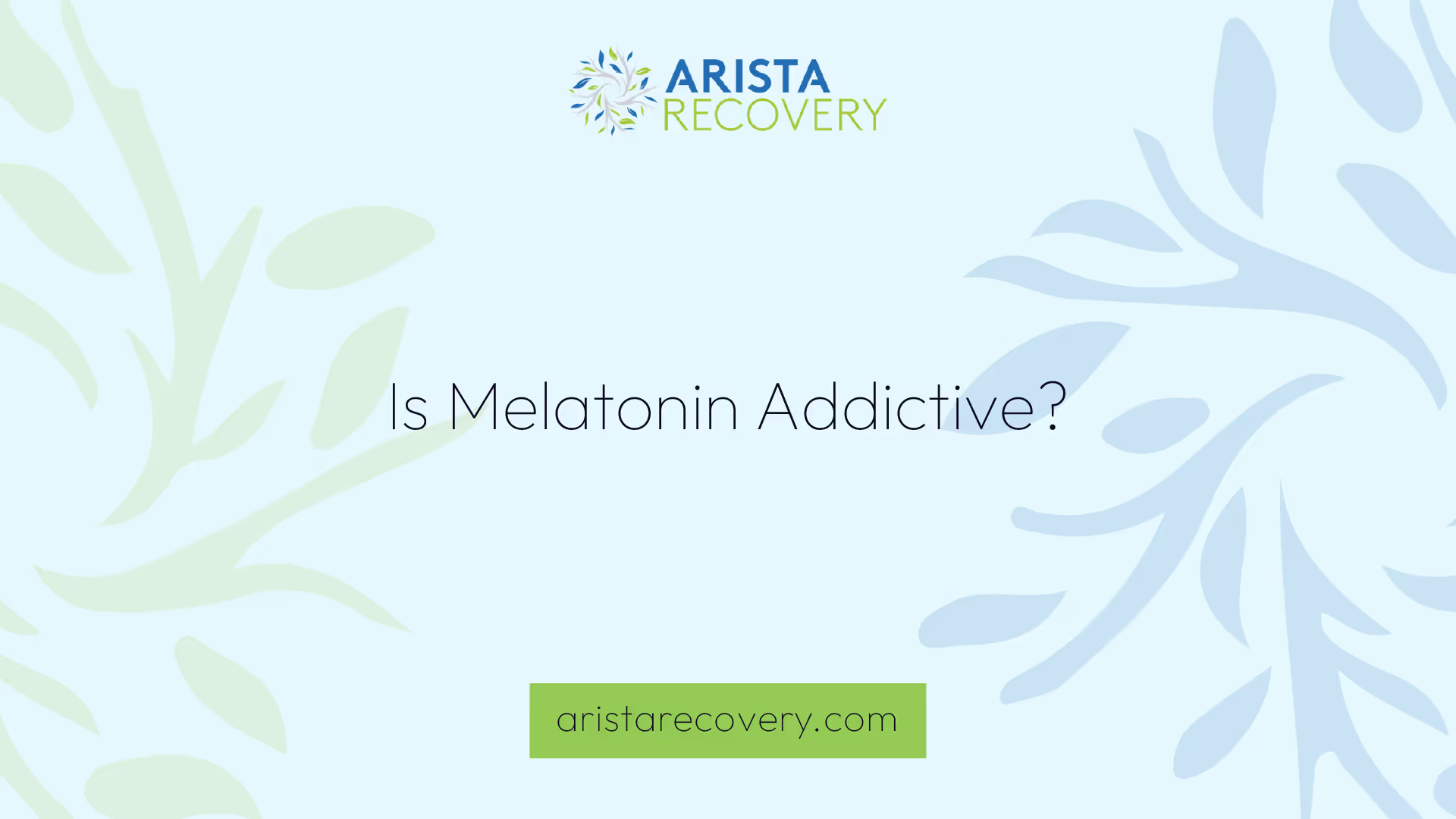Is Melatonin Addictive?

Understanding Melatonin
Melatonin is a hormone produced by your brain that plays a significant role in regulating your sleep-wake cycle. But when it comes to supplementation, many people wonder, "Is melatonin addictive?" and "Is it safe?". In this section, we'll delve into these concerns and discuss the variable content of melatonin in over-the-counter supplements.

Safety and Dependency
According to the Mayo Clinic, melatonin is generally safe for short-term use. Individuals are unlikely to become dependent on it, have less response to it after repeated use, or experience a hangover effect like with many sleep medications. Echoing these findings, both the New York Times and the Cleveland Clinic stress that melatonin is not addictive. There is no evidence that physical dependence on the supplement can occur, and withdrawal symptoms typically do not develop if the intake is stopped.
Moreover, while some individuals speculate whether melatonin can increase the body's tolerance, leading to a need for higher doses, these symptoms of addiction have not been linked to melatonin supplements. Further, taking melatonin does not cause physical dependency, as the body is already naturally dependent on this hormone for sleep. There is no concrete evidence suggesting that melatonin supplementation suppresses the body's ability to produce melatonin.
Melatonin Content Variability
While melatonin supplements can improve sleep in specific cases, it's important to note that the actual melatonin content could vary significantly from what is advertised. A study highlighted by the Cleveland Clinic found that the melatonin content across 31 supplements ranged from 83% less than advertised up to 478% more than advertised. This variability can lead to uncertainty about the precise dosage one is consuming, which underscores the importance of purchasing supplements from trusted, reputable sources.
In summary, current research suggests that melatonin supplements are not addictive and are generally safe for short-term use. However, considering the potential variations in melatonin content in supplements, it's advisable to consult with a healthcare professional before starting any new supplement regimen.
Melatonin for Sleep Disorders
Melatonin, a hormone that plays a crucial role in sleep regulation, is often used in supplement form as a sleep aid. However, its effectiveness and safety can vary depending on the individual and their specific sleep disorder.
Conditions Benefiting from Melatonin
Studies suggest that supplemental melatonin may have the most potential benefits for individuals with conditions like delayed sleep-wake phase disorder (DSWPD) and non-24-hour sleep-wake disorder among adults [1]. However, it's important to note that melatonin supplements can improve sleep in specific cases, but the actual melatonin content could vary significantly from what is advertised. In one study, the melatonin content across 31 supplements ranged from 83% less than advertised up to 478% more than advertised.
Safety Concerns for Specific Groups
While melatonin is generally considered safe for short-term use, there are specific groups of individuals who should exercise caution. Scientists do not have enough information about the safety of melatonin usage during pregnancy, including whether it is safe to use when breastfeeding (chestfeeding). Therefore, it is advisable to avoid melatonin supplements during pregnancy or while trying to become pregnant until more research is conducted.
Similarly, melatonin supplements are possibly unsafe for individuals when taken frequently or in high doses while trying to become pregnant. There is insufficient reliable information to determine the safety of melatonin in lower doses during attempts to become pregnant.
Side effects of melatonin may include headaches, increased sleepiness upon waking up, and dizziness. Although most people do not experience side effects, it is crucial to monitor for any adverse reactions after taking the recommended dose and discontinue use if symptoms worsen.
It's important to consult with a healthcare provider before starting any new supplement regimen, especially if you fall into one of these categories.
Melatonin and Pregnancy
As we explore the question, "is melatonin addictive?", it's also important to consider its safety during specific life stages, such as pregnancy and breastfeeding.
Safety During Pregnancy
The safety of melatonin usage during pregnancy remains unclear. Melatonin supplements are possibly unsafe for individuals when taken frequently or in high doses while trying to become pregnant. There is insufficient reliable information to determine the safety of melatonin in lower doses during attempts to become pregnant.
Due to the lack of comprehensive research, it's advisable to avoid the use of melatonin supplements during pregnancy until more conclusive evidence is available. If a pregnant individual is considering melatonin supplements due to sleep disorders or other issues, it's recommended to consult with a healthcare provider first.
Safety During Breastfeeding
The safety of melatonin during breastfeeding (chestfeeding) is also uncertain. Scientists do not have enough information about the safety of melatonin usage during this period. As such, it's advisable to avoid the use of melatonin supplements while breastfeeding until additional research is conducted.
It's critical to prioritize safety when considering the use of melatonin or any other supplements during pregnancy and breastfeeding. While melatonin is not considered addictive according to sleep experts and psychologists, and there is no evidence that physical dependence on the supplement can occur, the potential effects on pregnancy and breastfeeding are not fully understood [2].
In conclusion, while melatonin is not addictive and does not cause physical dependency, its safety during pregnancy and breastfeeding remains uncertain due to a lack of substantial research. Therefore, it's best to consult with a healthcare provider before considering the use of melatonin supplements during these life stages.
Melatonin and Addiction
In the context of addiction management, the question "is melatonin addictive?" often arises. This section aims to delve into the potential benefits and limitations of using melatonin in addiction management.
Potential Benefits in Addiction Management
Recent evidence suggests that a dysregulation of endogenous melatonin rhythm or action may play a larger role in the etiology and behavioral expression of drug addiction than previously considered. This includes disruptions in circadian rhythms and circadian genes in individuals with addiction.
Studies have shown that melatonin is able to modulate the reinforcing or relapsing effects of certain drugs of abuse. In animal studies, melatonin supplementation has been shown to reduce anxiety-like behavior and relapse-like drinking behaviors associated with cocaine withdrawal in rats. Additionally, it has been found to prevent the development of morphine-induced behavioral sensitization and analgesic tolerance in rats [3].
These promising findings suggest that melatonin could potentially be a useful tool in addiction management, particularly in helping to manage withdrawal symptoms and prevent relapse.
Concerns and Limitations
Despite the potential benefits of melatonin in addiction management, it's important to note there are potential drawbacks. According to recent studies, repeated exogenous melatonin administration may cause a disruption of its endogenous rhythm, which might limit its usefulness [3].
In other words, while melatonin may help manage the symptoms of drug withdrawal and addiction in the short term, long-term use could potentially disrupt the body's natural melatonin production and rhythm. This disruption could potentially lead to other health issues, including sleep disorders.
In conclusion, while melatonin shows promise as a potential aid in addiction management, more research is needed to fully understand its potential benefits and limitations. In the meantime, it's important for individuals struggling with addiction to seek professional help and consider a variety of treatment options. As with any supplement, it's crucial to consult with a healthcare provider before starting melatonin supplementation.
Melatonin Dosage and Side Effects
Melatonin, a hormone the body produces naturally, is often used in supplement form to aid sleep. As with any supplement, it's essential to use the correct dosage and be aware of potential side effects. When considering the question, "is melatonin addictive?", it's crucial to examine these factors.
Recommended Dosages
The recommended dosages of melatonin can vary depending on the individual's needs and specific conditions. For assistance in falling asleep, doses ranging from 1 to 3 mg are often recommended. However, for specific sleep disorders such as REM sleep behavior disorder, higher doses of 10 to 15 mg may be beneficial.
It's important to note that while there doesn't appear to be any harm in taking melatonin daily for extended periods, it's advised to keep healthcare providers informed, especially if taking it consistently for more than a month. This is due to the limited data on the long-term safety of melatonin [4].
Monitoring Side Effects
Melatonin is generally considered safe for short-term use in adults, but it may cause some side effects. Some people may experience increased sleepiness upon waking up, headaches, or dizziness. At higher doses, adverse effects such as headache and nausea may occur.
Importantly, melatonin can also interact with certain medications, like blood thinners. Therefore, individuals with preexisting health conditions or those taking prescription medications should consult with a doctor before taking melatonin supplements.
As melatonin is not FDA-regulated, the actual content can vary from 80% to 400% of the advertised amount. Therefore, monitoring for side effects is essential, especially when considering melatonin for children [4].
In the case of concerns about having taken too much melatonin, it is recommended to contact poison control for immediate guidance. For parents and caregivers, it's crucial to practice safe storage of all medications and supplements around the house to avoid accidental ingestion by young children [5].
In conclusion, while melatonin can be beneficial for sleep disorders or to aid in falling asleep, it's important to use it responsibly, monitor for side effects, and consult with a healthcare provider as needed.
Melatonin Regulation and Research
When discussing melatonin, it's essential to understand its regulation and the ongoing research on its effects and usage. This understanding will help address the question: 'is melatonin addictive?'.
FDA Regulation and Variability
Melatonin supplements, widely used for sleep aid, do not fall under the regulation of the FDA [2]. Consequently, the actual levels of melatonin in these products can vary significantly, from 80% to 400% of what is advertised. This variability emphasizes the importance of being aware of the dosage and other ingredients in the supplement, especially when considering melatonin for children, where additional safety precautions should be followed.
The usage of melatonin has seen a consistent increase among adults in the United States over the last two decades. Its easy availability and perceived benefits in aiding sleep have led to its widespread use [5].
Emerging Research Findings
The question 'is melatonin addictive?' is frequently asked, given its widespread use. However, sleep experts and psychologists, through various studies, have found that melatonin is not addictive [6]. There is no evidence that physical dependence on the supplement can occur, and withdrawal symptoms typically do not develop if the intake is stopped.
Though concerns exist about potential harm with prolonged use, and some individuals speculate on whether melatonin can increase the body's tolerance, leading to a need for higher doses, these symptoms of addiction have not been linked to melatonin supplements [2].
Furthermore, research indicates that taking melatonin does not cause physical dependency, as the body is already naturally dependent on this hormone for sleep. There is no concrete evidence suggesting that melatonin supplementation suppresses the body's ability to produce melatonin.
While melatonin is not addictive, it's important to remember that individual reactions to supplements can vary, and any concerns should be discussed with a healthcare provider. Ongoing research aims to provide further clarity on the long-term effects and potential risks of melatonin use.
References
[1]: https://my.clevelandclinic.org/health/articles/23411-melatonin
[2]: https://health.clevelandclinic.org/melatonin-dependency
[3]: https://www.ncbi.nlm.nih.gov/pmc/articles/PMC6033744/
[4]: https://health.clevelandclinic.org/melatonin-dependency/
[5]: https://www.sleepfoundation.org/melatonin/melatonin-side-effects
[6]: https://www.nytimes.com/2022/09/06/well/mind/melatonin-dependency.html
You’re not alone in this.
When mental health challenges and addiction intersect, it can feel isolating. At Arista, we offer compassionate, evidence-based, and trauma-informed care to help you heal, grow, and move forward.
You’re not alone in this.
When mental health challenges and addiction intersect, it can feel isolating. At Arista, we offer compassionate, evidence-based, and trauma-informed care to help you heal, grow, and move forward.
Support that moves with you.
You’ve taken a brave first step. At Arista Recovery, we’re here to help you continue with best-in-class care designed for long-term healing and support.
.webp)






